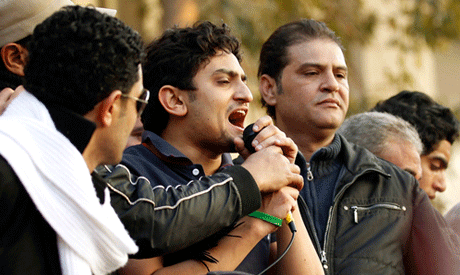
Google Inc executive Wael Ghonim addresses a mass crowd inside Tahrir Square in Cairo (Photo: Reuters)
The Egyptian cyber activists who were the driving force behind the uprising that overthrew former President Hosni Mubarak said Monday they had met the country's military rulers to discuss democratic reform.
"We met the army ... to understand their point of view and lay out our views," said Google executive Wael Ghonim and blogger Amr Salama, in a note on a pro-democracy website that helped launch the revolt.
Eight activists held talks on Sunday with General Mahmud Hegazy and General Abdel Fattah, two members of the Supreme Council of the Armed Forces, a body of some 20 generals who were mostly unknown to the public before the uprising.
The meeting is a sign of the army's break with the style of Mubarak's regime, which was slow to acknowledge youth activists as a legitimate opposition force.
"The army has stressed that it does not seek to rule Egypt and that a civil state is the only way forward," Ghonim and Salama said.
The council has vowed it would pave the way for an elected civil authority to build a free democratic state, and said that the cabinet picked by Mubarak on January 31 would remain in place to run state affairs.
The activists said the army told them that a referendum would take place in two months over amendments to the constitution, which was suspended on Sunday as both houses of parliament were dissolved.
A panel "would finish working on the amendments within 10 days, and then there will be a referendum within two months," the activists said.
The army could not be reached for comment and the activists did not immediately respond to requests for more details.
The constitution was amended in 2007 to put strict restrictions on presidential candidates, while the parliament was seen as illegitimate following November elections marred by allegations of fraud.
As it began to dismantle the symbols of the old regime, the army vowed to "prosecute all those accused of corruption, no matter what their previous or current posts are."
The military -- which has been accused by human rights groups of detaining and torturing protesters during the revolt -- has also pledged to "find all the protesters who went missing."
Massive nationwide protests erupted on January 25 demanding the resignation of Mubarak, leaving at least 300 people dead and scores more injured or detained.
Mubarak stepped down on Friday, handing control of Egypt over to the military.
Short link: